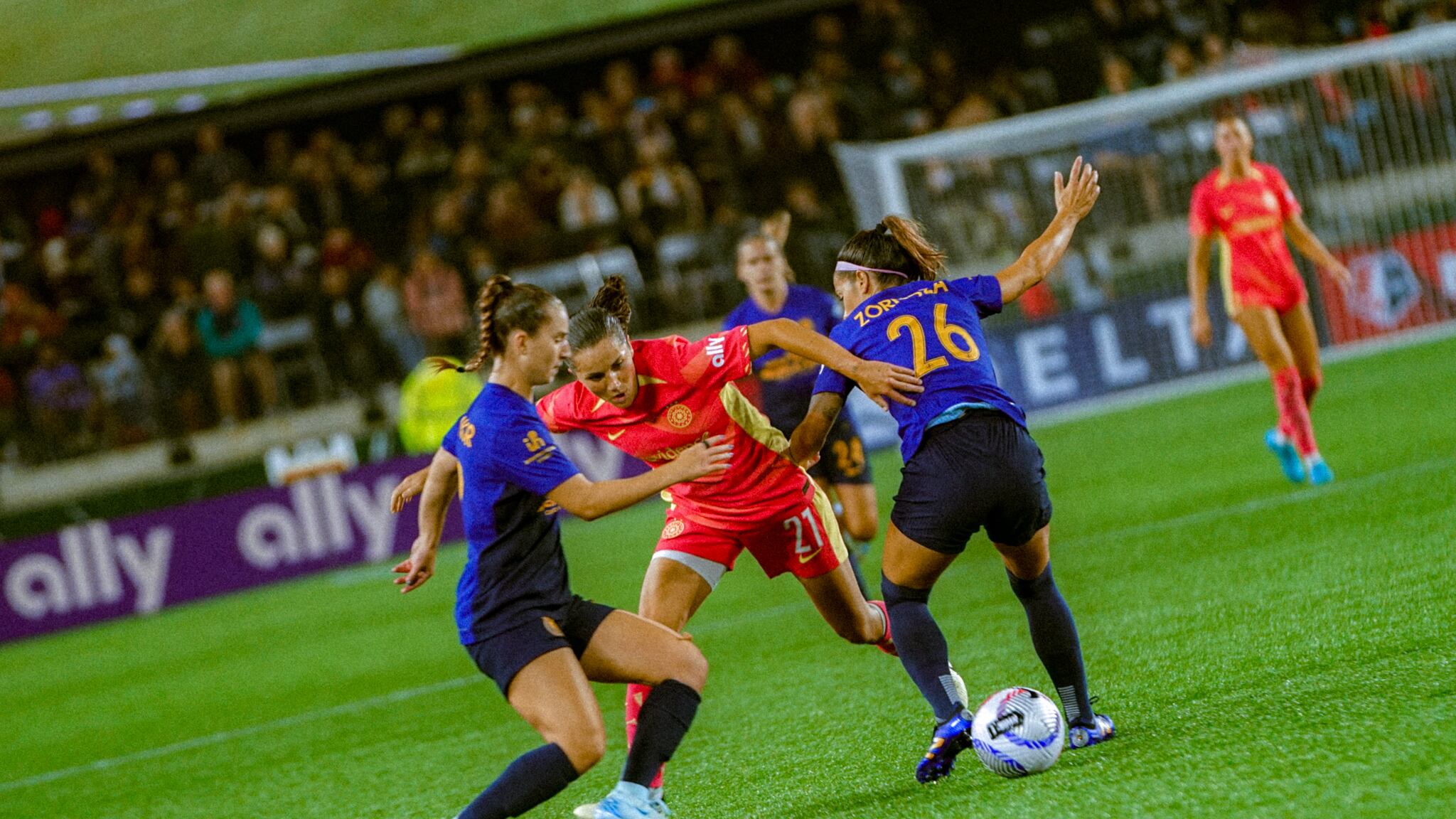Saturday was a perfect night for a game of soccer, punctuated by cool air, a clear sky and the chants of 17,000 fans in red. It was a big match: Hovering at the edge of the playoff picture, Portland Thorns FC needed a win over the Utah Royals to stop their downward plunge in the standings.
Mackenzie Grover has been a Thorns fan for almost a decade. But before the game, she expressed something new and unfamiliar to the club: low expectations.
“Coming back from the Olympics, it feels a little less consistent, a little more disjointed,” Grover said. “But it’s a rebuilding year, right?”
Right. Because the Thorns proceeded to do what is beginning to feel routine for the team: They took the field on Oct. 5, struggled to possess the ball and ultimately failed to find a win over the Royals. The Thorns now sit in seventh place, with a date looming with juggernaut Orlando. Only eight teams make the playoffs.
This might be what rebuilding feels like. And it feels pretty empty at the center.
Portland isn’t known for dominating possession, but they have historically thrived through their midfield, using the center of the park to dictate play and connect a multifaceted attack while their fullbacks provided width and stretched opposing defenses. This year that midfield facet of the Thorns’ identity is missing.
Instead, it feels like Portland is almost adverse to playing through the center. When they did try against Utah, they ended up turning over the ball as often as they were able to generate attacking chances. Being a team that can hurt you up the flanks is a lot less threatening than a team that can hurt you everywhere on the field.
Part of the problem clearly traces back to personnel changes ahead of the 2024 season. Crystal Dunn, whom the Thorns lost after their 2023 run, is a world-class player in almost every position, but she shone for Portland as a box-to-box midfielder who could add to their attack with brilliant through balls or by providing a late run or a well-placed shot. Rocky Rodríguez, Portland’s other major offseason loss in midfield, largely spent a not-insignificant portion of her last season with Portland coming off the bench. But she, too, is a top-tier footballer who can drop into a more defensive role or spin to hit a golazo from the top of the box.
Portland tried to fill the hole Dunn and Rodríguez left behind when they signed Canadian international Jessie Fleming. Although the 26-year-old joined the team accompanied by a storied career for both her senior national team, which she’s played for since the age of 15 and has helped to Olympic gold and bronze medals, and club team, Chelsea FC, Fleming has struggled to adapt to the Thorns.
“Some of it is just about time,” Fleming told the media of Portland’s difficulty in maintaining possession against the Royals, “and just continuing to build those relationships.”
It’s fine if relationship-building is where Fleming’s at. (Adjusting to a new team and a new league is a process.) But Portland needs a midfield that’s playing as a cohesive unit, especially when they’ve had almost a full season to figure things out.
The other problem with Fleming still figuring out how to be the player we know she can be for the Thorns is that Portland doesn’t have a lot of other options while she adapts. The vast majority of the Thorns midfield minutes have gone to the quartet of Fleming, Olivia Moultrie, Hina Sugita and Sam Coffey, with Christine Sinclair occasionally slotting in when the team needs another body.
Worse, Sugita, one of the most solid players for the Thorns this year, seems to be out indefinitely with a facial injury she sustained against the Chicago Red Stars in September. (Portland head coach Rob Gale had no real update on Sugita’s return when he talked to the media after the team’s loss to Utah.)
And then there’s Moultrie, a promising young player who’s shown up really well in moments for Portland. But note those terms “promising” and “young.” She’s still working on her own decision-making, and she doesn’t yet have the experience needed to step up and take most of Portland’s midfield into her own hands.
That leaves the Thorns with one uninjured consistent option in Coffey. Don’t get me wrong: Coffey is an outstanding defensive midfielder, and her being a team’s best midfielder isn’t in itself a problem. (It isn’t great, though, in terms of player longevity and minutes management, that she’s played a lot this year for both club and country. In fact, between USWNT duty and her games for the Thorns, Coffey has played over 2,450 competitive minutes this calendar year—that’s over 27 full games.)
Coffey being Portland’s best midfield option looks worse when a team is performing like the Thorns did against Utah, when Fleming keeps giving up turnovers, when Sinclair and Moultrie are playing high enough up the field that Morgan Weaver, who’s playing as a striker, has to regularly drop back to get the ball, and when the Thorns’ best option on the bench is recent acquisition Sophie Hirst, who hasn’t yet played a single league minute for Portland.
Or, in the words of the patient fan Grover, “We don’t really have any other options right now that have played with the team for long enough to really feel like they’re connecting well.”
Whether the Thorns’ current position is an issue of club management signing the wrong players when trying to build their roster or not knowing how to manage the ones they do have is a bigger question.
But it doesn’t change the facts: Portland’s midfield is struggling, and it’s too late in the season for them to do anything but try to play through it. Maybe they’ll rebuild next year.

